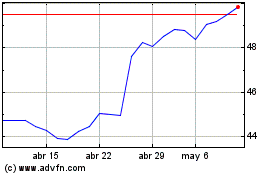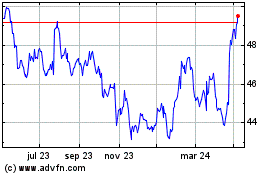Unilever to Give Investors Advisory Vote on Climate-Change Plan
14 Diciembre 2020 - 1:13PM
Noticias Dow Jones
By Saabira Chaudhuri
Unilever PLC said it would become the first major company to
voluntarily give shareholders a vote on its efforts to reduce
carbon emissions, seeking greater engagement with investors on
climate issues.
The owner of Dove soap and Ben & Jerry's ice cream said
Monday it would seek approval from investors every three years on
its plan to mitigate its carbon impact and the risks of climate
change on its business. However, the vote would be only advisory
and doesn't require Unilever to make changes.
Major investors say they are putting more emphasis on addressing
the threats posed by climate change, with shareholder resolutions
on the issue becoming more common. By proposing its own climate
resolutions for shareholders to vote on -- which take into account
the challenges and realities of achieving them -- Unilever is in
the driving seat, said one big investor.
BlackRock Inc., one of Unilever's largest investors, said
earlier this year that it would be increasingly likely to vote
against management and boards if companies don't disclose
climate-change risks and plans in line with key industry
standards.
Climate Action 100+, a group of large investors including
BlackRock that is pressuring companies to act on climate change,
welcomed Unilever's announcement as meaningful.
"Despite only being an advisory vote, it will allow investors to
provide a clear statement of intent to the company about the
importance of sticking to its plans for a transition to net-zero
emissions," said Piers Hugh Smith, the investor group's point
person for Unilever.
A Unilever spokeswoman said investor interest in managing the
transition to net zero was growing and that the company wanted to
send a signal that it was serious about meeting these targets.
The consumer-goods giant is among the growing number of
companies setting public targets for cutting carbon emissions over
the next few years. London-based Unilever has promised to eliminate
emissions from its own operations by 2030 and to do the same from
sourcing to point of sale by 2039. It also plans to halve the
footprint of its products in the next decade, which involves the
more difficult process of cutting emissions from consumers using
its products.
To achieve those goals, Unilever said it would need to rethink
the raw materials it sources, use more renewable energy and
eliminate deforestation from its supply chain, among other
measures. The company said it would rely on carbon credits to
balance residual emissions.
Nestle SA said earlier this month that it would invest the
equivalent of about $3.6 billion over the next five years in
cutting carbon emissions as the Nescafe coffee owner works toward
hitting its own targets. Other consumer-goods giants such as
Colgate-Palmolive Co., Procter & Gamble Co. and Kimberly Clark
Corp. have made similar pledges.
Unilever said it would share more details about its climate
strategy in the first quarter and plans to report on its annual
progress in 2022.
Write to Saabira Chaudhuri at saabira.chaudhuri@wsj.com
(END) Dow Jones Newswires
December 14, 2020 13:58 ET (18:58 GMT)
Copyright (c) 2020 Dow Jones & Company, Inc.
Unilever (EU:UNA)
Gráfica de Acción Histórica
De Mar 2024 a Abr 2024

Unilever (EU:UNA)
Gráfica de Acción Histórica
De Abr 2023 a Abr 2024
